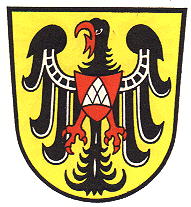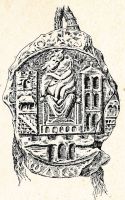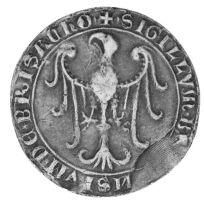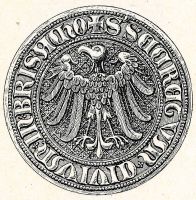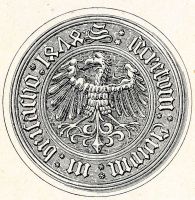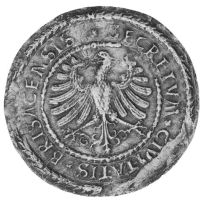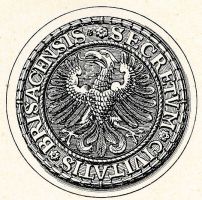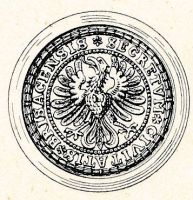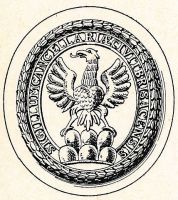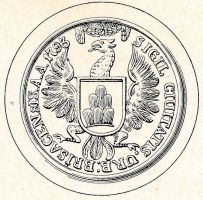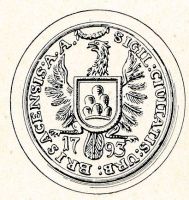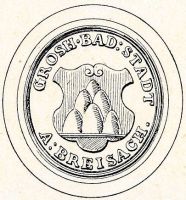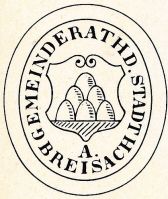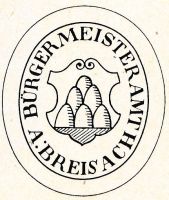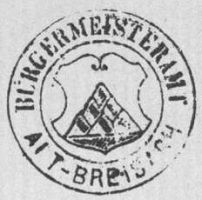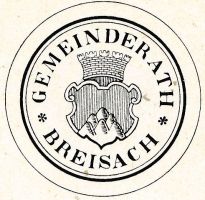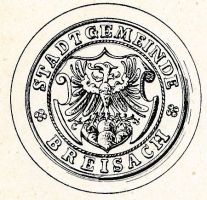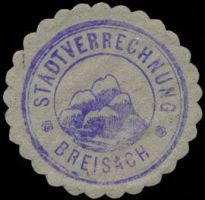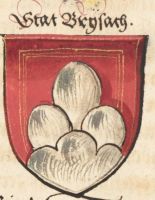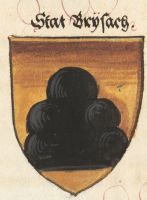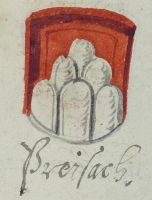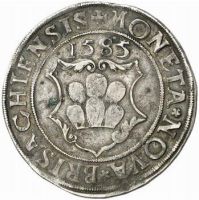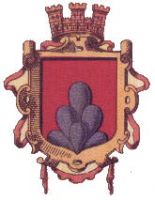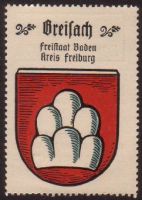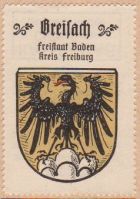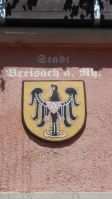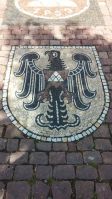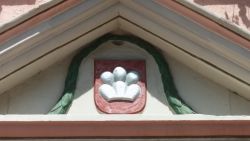Breisach am Rhein
This page is part of the German heraldry portal Deutsche Wappensammlung |
Heraldry of the World |
|
German heraldry:
|
Selected collector's items from Germany:
|
BREISACH AM RHEIN
State : Baden-Württemberg
District (Kreis) : Breisgau-Hochschwarzwald (until 1973 Freiburg)
Additions : 1972 Gündlingen, 1973 Niederrimsingen, 1975 Oberrimsingen (1936 Grezhausen)
| German |
In Gold ein schwarzer, rotbewehrter Adler mit rotem Brustschild, darin ein silberner Sechsberg. |
| English | am Rhein No blazon/translation known. Please click here to send your (heraldic !) blazon or translation |
Origin/meaning
The arms were officially granted on November 5, 1956.
Breisach received city rights in 1275 by King Rudolf of Habsburg. The town has been of strategic importance on the Rhine already two centuries before. The town was first ruled by the Bishops of Basel, in 1185 it became partly a possession of King Heinrich VI. At the end of the 12th century it was mentioned as a possession of the Counts of Zähringen, since 1245 again from the Bishops of Basel. Around 1260-1270 it became again an imperial town under King Rudolf. The city remained an Imperial City, even after 1331 when it became an Austrian loan. This didn't end the changes of government, as the city became French in 1639 and Austrian again (by force) in 1699. Finally in 1806 it became part of Baden.
The oldest seals reflect the changes in government. The oldest seal is mentioned in 1227 and known since 1234. It shows a single headed Imperial Eagle. The town was considered an Imperial Town, even though it had no city rights at the time. Another 13th century seal shows a castle with a wavy bar (the Rhine) and above the tower an image of the St. Mary on a throne. St. Mary is the patron saint of the Bishops of Basel. The seal thus dates from after 1245. After 1273 when Breisach became an Imperial City all seals have shown the Imperial Eagle.
The seals of the city:
As arms for the town, however, the arms of the Von Grünenberg family were used (in red a silver 6-topped mountain). Members of this family acted as vassals for the Austrians since the end of the 14th century. The arms are first seen on coins struck in 1425. It is known from many different sources throughout the centuries. On the seals, only the eagle was used.
The first time the combination of the arms as an escutcheon on the eagle, is used on seals dates from the second half of the 18th century. Many different images, however, still showed the arms without the eagle.
During the 19th and first half of the 20th century, both the old arms as well as the combination were used. In 1927 it was decided that the eagle had no place in the arms. Finally, in 1955, it was decided to use both the eagle and arms as a combination. The present arms were thus granted on November 5, 1956.
The arms in a 16th century manuscript
The arms by Hupp in the Kaffee Hag albums +/- 1925
The arms by Hupp in the Kaffee Hag albums +/- 1925
Literature: John, H. : Wappenbuch des Landkreises Breisgau-Hochschwarzwald. Kohlhammer, Stuttgart, 1994.
Contact and Support
Partners:
Your logo here ?
Contact us
© since 1995, Heraldry of the World, Ralf Hartemink 
Index of the site


